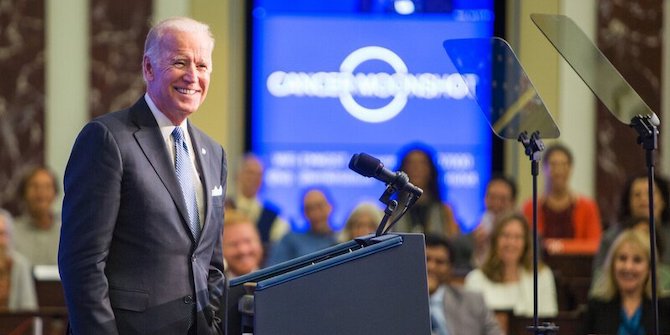A first strike but not a last resort
President Joe Biden announced a military strike in Syria, the first strike of his presidency.
February 26, 2021
On Thursday, Feb. 26, President Joe Biden conducted a military strike against ‘Iranian-backed militias’ in Syria, the first military strike of his presidency.
The move drew a howl of condemnations and also called into question the fragility of the Iran deal. Media has recently been abuzz with whispers of the deal’s renewal, but Biden’s aggressive strike adds to the dilemma. The deal, officially termed the Joint Comprehensive Plan of Action, called for a gradual reduction in Iran’s uranium enrichment under IAEA monitoring in return for termination of certain sanctions imposed by the EU and the U.S. Biden has indicated his desire to re-join the deal, but so far nothing has come to fruition except an aggressive strike.
That is principally because, as the Department of State noted, President Rouhani must make the first move. But this approach will yield nothing except for further inflamed tensions, which creates fodder for the very dangers America purports to be against. In order to diffuse the dilemma, America must act first by acknowledging the point of view of Iran.
From Iran’s perspective, America has consistently demonstrated its aggression against Iran in particular and therefore cannot be trusted to another deal unless they demonstrate otherwise. The first instance of such aggression was in 1953 in response to Iran’s Prime Minister, Mohammad Mosaddegh. His government tried to nationalize the Iranian oil industry, which had been built up by the British in Iran decades ago. Mosaddegh, ‘Iran’s last democratically elected leader,’ was overthrown when the British convinced the U.S. to intervene and restore Shah Pahlavi’s power. The CIA’s propaganda, bribes and orchestrated violence led to the death of hundreds, a later hostage crisis and the repressive rule of the Shah for the next 26 years.
One cannot understate the impacts the 1953 coup had on the region. We still feel its effects today in the loathing America seems to have for Iran. Since at least 2013, Americans have consistently rated Iran as the greatest threat to world peace. Just a few weeks ago, according to the Washington Post, the U.S. even flew a B-52 bomber over the Persian Gulf, where we also are keeping an aircraft carrier. Does this constitute defense? No. Rouhani has no reason to attack the U.S. The probability of a first strike by Iran is infinitesimal, especially when considering the sheer power of the American military. We must therefore ask ourselves why the U.S. is so involved in the affairs of a country 6,000 miles away. Why do we spend, as Forbes noted, billions of dollars on overseas failed imperialism when we have so much we could better spend that money on?
The only external entities that should be so thoroughly involved in Iran’s affairs should be the U.N. and the IAEA. According to the AP, the IAEA, which reports to the U.N., found that Iran was following the 2015 deal to the letter even months after the U.S. withdrew. America’s bellicose behavior has therefore been warrantless and fruitless. The U.S. essentially pulled out of the deal first by re-imposing sanctions, waited until Iran reciprocated, casually assassinated an Iranian general then feigned fear when Iran resumed uranium enrichment.
This is raw hypocrisy. Just as a person who withdraws from a contract cannot complain about the cosigner’s withdrawal, America cannot complain when Iran reciprocates the gesture initiated by the U.S. We violated the deal first. We constantly vilify Iran for the pretend purpose of protecting our troops (such as those in Syria), even though the only way to ensure troop safety is to have none in the Middle East. Repulsively, the government doesn’t really care about lives lost. They care about regime change and natural resources. Still, for all the fear mongering America has made about Iran’s nuclear future, one critical reality has been ignored: if there’s one country that can’t be trusted with nuclear weapons, it’s the U.S. After all, we are the only country to have used them in warfare on civilians, of whom 220,000 died. As Business Insider noted, America has also lost more nuclear weapons than any country, even on a per-capita basis.
What is the point of all this? It is not to disparage America without prescription. Rather, it is to apply the same standards to ourselves as we would to other countries. If another country overthrew our elections, had troops on our borders, assassinated our military leaders and signed a deal but quickly reneged, we would rightly be outraged. America has gone to war for less than that. Yet we have normalized it, even as our belligerence and unstable leadership withers away at international reverence for America. Our quick change in national policy on the deal from one leader to another certainly calls into question the sincerity with which America will join future agreements.
The U.S. cannot afford to continue Cuban Missile Crisis-style diplomacy, whereby we blame the reciprocators of our reckless misdeeds rather than acknowledging our own faults. Doing this has only brought us lower and lower (121st) in the Global Peace Index. In my mind, a person who wishes to understand the world around them, past, present and prospective, must deeply understand the ideas of others.
Likewise, if America wants to restore even a modicum of its lost-to-Trump hegemony, we must seek to understand the perspectives of all other countries, including Iran. That is real patriotism; if you truly want the best for your country, you must acknowledge its faults and the beliefs other countries have about yours. It is by these means only that progress is made on the world stage.









